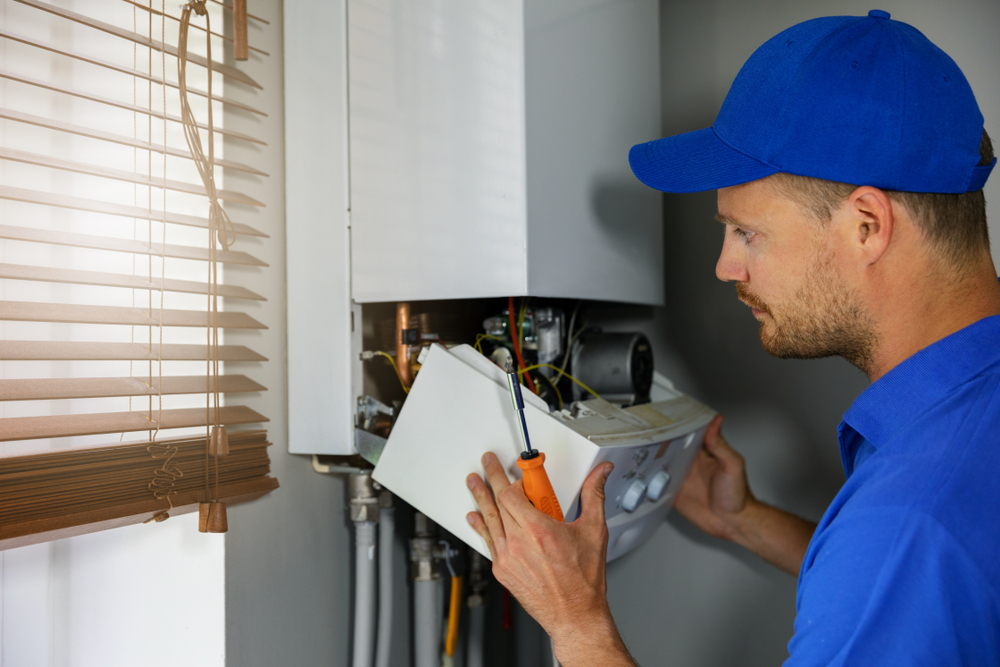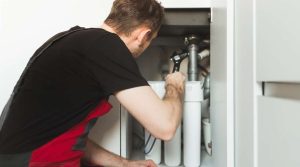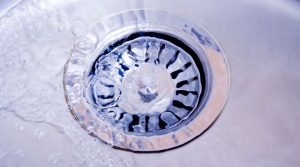When it comes to the functionality and longevity of your water heater, regular maintenance is paramount. Just Us Plumbing understands the importance of keeping your water heater in top shape, which is why we emphasize the significance of following a maintenance schedule.
By adhering to a maintenance schedule, you can prevent costly breakdowns and extend the lifespan of your water heater. Our team of expert technicians recommends scheduling professional inspections and servicing at least once a year to ensure optimal performance. This includes checking for leaks, flushing the tank to remove sediment buildup, and examining key components for wear and tear.
Neglecting regular maintenance can lead to decreased efficiency, higher energy bills, and even complete system failure. A well-maintained water heater not only provides reliable hot water for your daily needs but also saves you money in the long run. Let Just Us Plumbing take care of your water heater maintenance needs, ensuring that you never experience the inconvenience and stress of a malfunctioning water heater. Trust us to keep your water heater running smoothly and efficiently for years to come.
The Importance of Regular Maintenance for Water Heaters
Water heaters are an essential part of our daily lives, providing hot water for bathing, cooking, and cleaning. However, many homeowners overlook the importance of regular maintenance for their water heaters. Regular maintenance is crucial for the efficient and reliable operation of your water heater, as well as for extending its lifespan.
During regular maintenance, a professional technician will inspect your water heater for any signs of wear and tear. They will check for leaks, corrosion, and other issues that can lead to a breakdown. Additionally, they will flush the tank to remove sediment buildup, which can reduce the efficiency of the water heater and cause it to work harder, leading to higher energy bills.
Regular maintenance also allows the technician to identify and address any minor problems before they become major issues. By catching and fixing problems early on, you can avoid costly repairs or even the need for a complete replacement. Regular maintenance is an investment in the longevity and performance of your water heater, saving you time, money, and inconvenience in the long run.
Signs That Your Water Heater Needs Maintenance
While regular maintenance is essential, there are also signs that indicate your water heater may need immediate attention. These signs should not be ignored, as they can be early indicators of a more significant problem. If you notice any of the following signs, it’s time to schedule a maintenance visit:
- Lack of hot water: If your water heater is not providing enough hot water or the water takes a long time to heat up, it may indicate a problem with the heating element or a buildup of sediment in the tank.
- Strange noises: A water heater should operate quietly. If you hear popping, cracking, or rumbling sounds coming from your water heater, it may indicate sediment buildup or a faulty heating element.
- Leaking water: Leaks around the water heater or pooling water near the unit are signs of a problem that requires immediate attention. Leaks can be caused by a variety of issues, including a faulty pressure relief valve or a crack in the tank.
- Rusty or discolored water: If the hot water coming out of your faucets is rusty or discolored, it may indicate corrosion inside the water heater. This can be a sign of a failing anode rod or a deteriorating tank.
- Foul odors: Foul-smelling water indicates the presence of bacteria in the tank. This can be caused by a lack of regular flushing and cleaning of the tank.
If you notice any of these signs, don’t ignore them. Schedule a maintenance visit with a professional technician to address the issue before it worsens.
The Benefits of Following a Maintenance Schedule
Following a maintenance schedule for your water heater offers several benefits. Here are some of the key advantages of regular maintenance:
- Enhanced efficiency: Over time, sediment builds up at the bottom of the water heater tank, reducing its efficiency. Regular flushing of the tank removes this sediment and allows the water heater to operate at its optimal efficiency, saving you money on energy bills.
- Extended lifespan: Regular maintenance helps to identify and address minor issues before they become major problems that can shorten the lifespan of your water heater. By addressing these issues early on, you can extend the life of your water heater and avoid the cost of premature replacement.
- Cost savings: Investing in regular maintenance may seem like an added expense, but it can actually save you money in the long run. By preventing major breakdowns and addressing minor issues promptly, you can avoid costly repairs or the need for a new water heater.
- Improved performance: A well-maintained water heater provides reliable hot water when you need it. You won’t have to worry about cold showers or inconsistent water temperature. Regular maintenance ensures that your water heater performs at its best, meeting your hot water needs efficiently and effectively.
- Peace of mind: Knowing that your water heater is regularly maintained gives you peace of mind. You can trust that it will continue to operate reliably, providing hot water for your daily needs without any unexpected interruptions.
By following a maintenance schedule, you can enjoy these benefits and ensure that your water heater remains in top condition for years to come.
DIY Water Heater Maintenance Tips
While professional maintenance is recommended, there are some simple DIY tasks you can perform to keep your water heater in good shape between professional visits. These tasks include:
- Checking the pressure relief valve: The pressure relief valve on your water heater is designed to release excess pressure in the tank. Periodically check the valve to ensure it is functioning properly by lifting the lever and allowing some water to flow out. If the valve is not releasing water or is leaking, it may need to be replaced.
- Testing the temperature and pressure relief valve: The temperature and pressure relief valve is another important safety feature of your water heater. It prevents the tank from becoming overpressurized or overheated. Test the valve by pulling up on the lever to ensure that water is released. If the valve does not open or if it is leaking, it may need to be replaced.
- Flushing the tank: Sediment buildup can reduce the efficiency of your water heater. Flushing the tank annually can help remove this sediment and improve performance. To flush the tank, turn off the power supply to the water heater, connect a garden hose to the drain valve, and open the valve, allowing the water to drain out. Once the tank is empty, close the drain valve and refill the tank.
- Insulating the pipes: Insulating the hot and cold water pipes connected to your water heater can help reduce heat loss and improve energy efficiency. Pipe insulation is readily available at most hardware stores and is easy to install.
Remember to always follow the manufacturer’s instructions and exercise caution when performing DIY maintenance tasks. If you are unsure or uncomfortable with any task, it is best to leave it to the professionals.
Hiring a Professional for Water Heater Maintenance
While there are some maintenance tasks you can perform yourself, it is essential to hire a professional for regular water heater maintenance. A professional technician has the knowledge, experience, and tools necessary to perform a thorough inspection and service your water heater correctly.
During a professional maintenance visit, the technician will:
- Inspect the tank and connections: The technician will visually inspect the tank, pipes, and connections for any leaks or signs of damage.
- Check the pressure relief valve: The pressure relief valve will be tested to ensure it is functioning correctly.
- Flush the tank: Sediment buildup will be removed by flushing the tank, improving the efficiency and performance of your water heater.
- Inspect and clean the burner assembly: If you have a gas water heater, the burner assembly will be checked and cleaned to ensure proper operation.
- Examine the anode rod: The anode rod is a sacrificial component that protects the tank from corrosion. The technician will inspect the anode rod and replace it if necessary.
- Check the thermostat and heating elements: The technician will verify that the thermostat is set correctly and test the heating elements to ensure they are functioning properly.
By hiring a professional for water heater maintenance, you can have peace of mind knowing that your water heater is in capable hands. A professional technician will ensure that your water heater is functioning optimally and address any potential issues before they become major problems.
Common Water Heater Maintenance Tasks
During a professional maintenance visit, there are several common tasks that technicians perform to keep your water heater in top shape. These tasks include:
- Inspecting and cleaning the burner assembly: For gas water heaters, the burner assembly is inspected and cleaned to ensure proper combustion and efficient operation.
- Checking and replacing the anode rod: The anode rod is a vital component that helps prevent corrosion inside the tank. The technician will inspect the anode rod and replace it if it is heavily corroded.
- Flushing the tank: Flushing the tank removes sediment buildup, which can reduce the efficiency and lifespan of your water heater. The technician will drain the tank and flush it to remove any accumulated sediment.
- Testing the thermostat and heating elements: The thermostat is checked to ensure it is functioning correctly and set to the desired temperature. The technician will also test the heating elements to ensure they are working efficiently.
- Inspecting and tightening electrical connections: For electric water heaters, the technician will inspect and tighten any loose electrical connections to ensure safe and reliable operation.
- Checking for leaks: The technician will inspect the tank, pipes, and connections for any signs of leaks or damage. Any leaks found will be repaired or the necessary components replaced.
These tasks, performed by a professional technician, help ensure that your water heater operates at its best and extends its lifespan. Regular maintenance visits are an investment in the performance, efficiency, and reliability of your water heater.
Understanding the Different Types of Water Heaters and Their Maintenance Needs
There are several different types of water heaters available, including traditional tank water heaters, tankless water heaters, and heat pump water heaters. Each type has its unique maintenance needs.
Traditional Tank Water Heaters: Traditional tank water heaters store and heat a large volume of water in a tank. To maintain optimal performance, these water heaters require regular flushing to remove sediment buildup. The anode rod should also be inspected and replaced as needed to prevent corrosion.
Tankless Water Heaters: Tankless water heaters heat water on demand, eliminating the need for a storage tank. While tankless water heaters generally require less maintenance than traditional tank water heaters, they still benefit from periodic flushing to remove mineral deposits and scale buildup. The heat exchanger should also be inspected and cleaned to ensure efficient operation.
Heat Pump Water Heaters: Heat pump water heaters extract heat from the surrounding air to heat water, making them highly energy-efficient. Regular maintenance for heat pump water heaters includes checking and cleaning the air filter, inspecting the evaporator and condenser coils, and ensuring proper airflow.
Understanding the specific maintenance needs of your water heater is crucial for keeping it in top condition. Consult your water heater’s manufacturer manual or seek advice from a professional technician to ensure you are following the correct maintenance procedures for your specific type of water heater.
Frequently Asked Questions About Water Heater Maintenance
- How often should I schedule professional water heater maintenance? It is recommended to schedule professional water heater maintenance at least once a year. However, if you have hard water or notice any signs of issues, more frequent maintenance may be necessary.
- Can I perform water heater maintenance myself? While there are some tasks you can perform yourself, it is always best to hire a professional for regular maintenance. They have the expertise and tools to ensure thorough and proper servicing.
- What can I do to extend the lifespan of my water heater? Regular maintenance, such as flushing the tank and replacing the anode rod, can help extend the lifespan of your water heater. Additionally, being mindful of the temperature settings and not exceeding the maximum capacity of the unit can also help.
- How long do water heaters typically last? The lifespan of a water heater depends on various factors, including the type of water heater and the level of maintenance it receives. On average, a well-maintained water heater can last between 8 and 12 years.
- Are tankless water heaters maintenance-free? While tankless water heaters generally require less maintenance than traditional tank water heaters, they still benefit from periodic flushing and cleaning to remove mineral deposits and ensure efficient operation.
- What should I do if my water heater is leaking? If you notice any leaks from your water heater, it is essential to turn off the power and water supply to the unit. Contact a professional technician immediately to assess the situation and make the necessary repairs.
- What are the signs that my water heater needs to be replaced? Signs that your water heater may need to be replaced include frequent repairs, a significant decrease in efficiency, and a lifespan of over 10 years. A professional technician can assess your water heater and provide guidance on whether replacement is necessary.
Remember, if you have any questions or concerns about water heater maintenance, it is always best to consult a professional technician who can provide expert advice and assistance.
Conclusion: The Key Takeaways for Maintaining Your Water Heater
Regular maintenance is vital for the functionality, efficiency, and longevity of your water heater. By following a maintenance schedule and scheduling professional inspections at least once a year, you can prevent costly breakdowns, extend the lifespan of your water heater, and ensure reliable hot water for your daily needs.
Signs that your water heater may need maintenance include lack of hot water, strange noises, leaking water, rusty or discolored water, and foul odors. If you notice any of these signs, it is essential to schedule a maintenance visit with a professional technician.
While there are some DIY tasks you can perform, such as checking the pressure relief valve and insulating the pipes, it is crucial to hire a professional for regular water heater maintenance. A professional technician will perform thorough inspections, flush the tank, check and clean key components, and address any issues promptly.
Different types of water heaters have specific maintenance needs, so it is essential to understand the requirements for your particular water heater. Consult the manufacturer’s manual or seek advice from a professional technician to ensure you are following the correct maintenance procedures.
By investing in regular maintenance and understanding the specific needs of your water heater, you can enjoy the benefits of a well-maintained unit, including enhanced efficiency, extended lifespan, cost savings, improved performance, and peace of mind. Trust professionals like Just Us Plumbing to ensure your water heater remains in top condition, providing reliable hot water for years to come.
Frequently Asked Questions About Water Heater Maintenance:
- How often should water heater maintenance be scheduled?
- It’s advisable to have your water heater professionally inspected and serviced at least once a year.
- Can DIY maintenance replace professional servicing?
- While some tasks can be done yourself, it’s essential to have a professional regularly maintain your water heater to ensure thorough and proper servicing.
- What are the key signs that my water heater needs attention?
- Common signs include lack of hot water, unusual noises, leaks, rusty or discolored water, and unpleasant odors.
- How long is the average lifespan of a well-maintained water heater?
- Typically, a properly maintained water heater can last between 8 and 12 years.
- Are tankless water heaters completely maintenance-free?
- No, while they generally require less maintenance than traditional units, they still need periodic servicing to ensure optimal performance.






